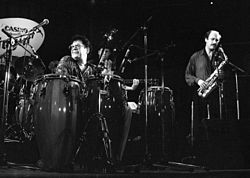Ray Barreto
| Ray Barretto | |
|---|---|

Ray Barretto, Deauville, Normandy, France, 1991
|
|
| Background information | |
| Born |
April 29, 1929 New York City, New York, U.S. |
| Died | February 17, 2006 (aged 76) Hackensack, New Jersey, U.S. |
| Genres | Latin jazz |
| Occupation(s) | Musician |
| Instruments | Congas, drums, percussion |
| Labels | Fania |
| Associated acts | The Blackout All-Stars, Fania All-Stars, Adalberto Santiago |
|
|
Ray Barretto (April 29, 1929 – February 17, 2006) was an American Grammy Award-winning Latin jazz percussionist.
Barretto (his real name,"Barreto", was misspelled on his birth certificate) was born in New York City. His parents moved to New York from Puerto Rico in the early 1920s, looking for a better life. He was raised in Spanish Harlem and at a young age was influenced by his mother's love of music and by the jazz of Duke Ellington and Count Basie.
In 1946, when Barretto was 17 years old, he joined the Army. While stationed in Germany, he met Belgian vibraphonist Fats Sadi. However, it was when he heard Dizzy Gillespie's "Manteca" with Gil Fuller and Chano Pozo that he realized his calling.
In 1949, when Barretto returned home from military service, he started to visit clubs and participated in jam sessions, where he perfected his conga playing. On one occasion Charlie Parker heard Barretto play and invited him to play in his band. Later, he was asked to play for José Curbelo and Tito Puente, for whom he played for four years. Barretto developed a unique style of playing the conga and soon he was sought by other jazz band leaders. Latin percussionists started to appear in jazz groups with frequency as a consequence of Barretto's musical influence.
In 1960, Barretto was a house musician for the Prestige, Blue Note, and Riverside labels. He also recorded on Columbia Records with Jazz flautist Herbie Mann. New York had become the center of Latin music in the United States and a musical genre called "pachanga" was the Latin music craze of the time.
In 1961, Barretto recorded his first hit, "El Watusi." He was quite successful with the song and the genre, to the point of being typecast (something that he disliked).
After recording a number of albums for the United Artists label, Barretto joined the Fania record label in 1967, and his first recording for the new label was the 1968 album Acid, an experiment joining rhythm and blues with Latin music. During this period, Adalberto Santiago was the band's lead vocalist. In 1972 Barretto's Que viva la musica was released. "Cocinando," a track from the album, opened the soundtrack of the Fania All Stars film Our Latin Thing in which Barretto had a role.
...
Wikipedia
